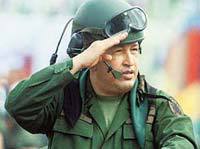Venezuela Launches Official Production of Third-Generation Kalashnikov Rifles
Venezuela has become the first nation in the world to make the iconic Kalashnikov third generation assault rifle on Russia's official license. The first batch of the legendary small arms that conquered the whole world has already been assembled at a Venezuelan enterprise, RIA Novosti reports with reference to Rosoboronexport official Alexander Yemelyanov.

Russian specialists simultaneously participate in the construction of a new factory in Venezuela, which would be built solely for the production of Kalashnikov rifles.
"The construction works are being conducted according to the schedule. We will also build another plant here which would produce ammo for Kalashnikovs," the official spokesman for Russia's defense export enterprise said.
All the works are to be completed in 2011. Venezuela conducts the construction, as well as the production of Kalashnikovs, within the scope of the contract that Russia concluded in 2009 during Hugo Chavez's visit to Moscow.
Russia Today: Hugo Chavez gives America a piece of his mind
Prime minister Vladimir Putin evaluated the cost of the agreement at $5 billion in April 2010. In addition to plants and production licenses, the contract stipulates a $2.2 billion loan, which Russia provided to Venezuela for the purchase of arms, including 92 T-72 tanks. Thirteen Russian enterprises are executing the Venezuelan orders.
The Kalashnikov rifle is the most widely spread assault rifle in the world today. If all the rifles that have ever been produced still existed, it would be possible to arm all armies in the world with them. There is hardly a person in the world who does not know what a Kalashnikov rifle is. Kalashnikovs were used in all local wars during the second half of the 20th century and the first decade of the 21st century.
During the 1950s, the USSR handed over Kalashnikov production licenses to 18 countries - mostly Warsaw Treaty allies. Eleven other countries launched the illegal production without licenses during the same period of time. It is impossible to count the number of countries which illegally produce small batches of AK rifles. The production of AK clones was launched in Asia, Africa, in the Middle East and even in Europe. Rosoboronexport said that all the licenses, which were issued to foreign countries before, had expired, but the production continues.
Over 100 million Kalashnikov rifles of different modifications are being used in the world today. The Russian rifle can fire both NATO 5.56 mm caliber cartridges and Soviet 7.62 mm caliber cartridges, which is the main advantage of this weapon. This "double standard" excludes serious competition for Kalashnikov on the world market, specialists say. Many defense experts acknowledge that man has not designed a weapon better than Kalashnikov. Nothing better will appear in the world before 2025, they say.
All the rifles of the 100th series are protected with patents, Rosoboronexport's director Anatoly Isaikin said.
"Kalashnikov rifles of the 100th series have the more advanced production technology. They are enhanced, universal and meet the requirements of modern-day wars. We learned the mistakes that we made in the past, and all Kalashnikovs of the 100th series have been patented and licensed. The situation that happened to AK-47, which was patented only in 1997, 50 years after it had been invented, won't repeat again," the official said.
Rosoboronexport has already received bids from several countries for the licensed production of this series. However, the defense export giant will not grant licenses to all countries.
As for Venezuela, Russia's relations with this nation have been special recently. Caracas is an active importer of the Russian defense technology. It became known in the spring of the current year that Russia had delivered the last four of 38 helicopters, which Venezuela ordered in 2005. The contract included the delivery of 20 Mi-17 B5, 10 Mi-35M, 3 Mi-26T, 3 Mi-172-3 and 2 Mi-172 choppers. The deal was evaluated at $500 million.
The news about the production of third-generation Kalashnikovs in Venezuela is not going to be a pleasant surprise for the United States. Washington is concerned about the penetration of the new rifle into the black arms market.
The Clinton administration banned the import of AK-47 (as all Kalashnikov models are referred to in the West) rifles due to its popularity among American criminal groups. Now Washington has another reason to give angry looks to Hugo Chavez, who owns the official Kalashnikov production license.
Ivan Tulyakov
Pravda.Ru
Subscribe to Pravda.Ru Telegram channel, Facebook, RSS!


